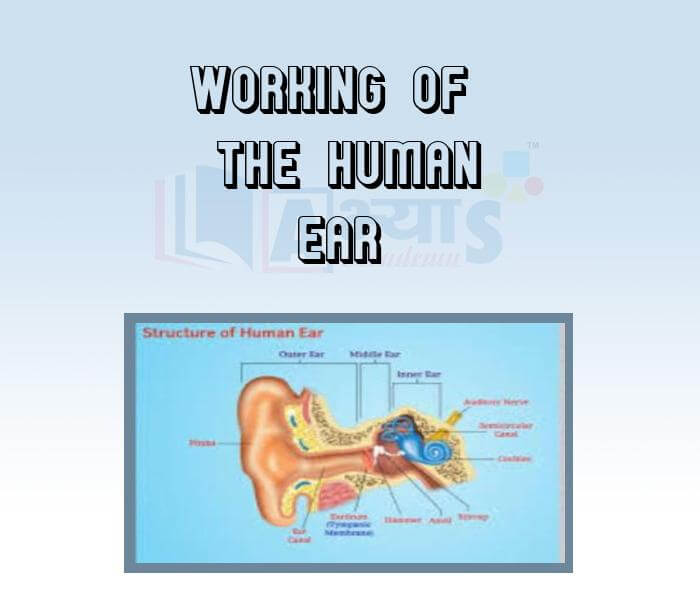Working of the Human Ear

Working of the Human Ear
Working of Human Ear: Pinna collects the sound waves from the surroundings. These collected sound waves pass through the ear canal (auditory canal) and fall on the eardrum. Since, sound waves are longitudinal waves, these waves consist of compressions (high pressure regions) and rarefactions (low pressure regions).
When a compression of the medium reaches the eardrum, the pressure on the outside of the membrane (eardrum) increases and forces the eardrum inward. Similarly, when the rarefaction of sound wave falls on the eardrum, the pressure on the outside of the membrane (eardrum) decreases and it moves outward. In this way, when sound waves fall on the eardrum, it starts vibrating back and forth rapidly.
These vibrations are amplified several times by the three bones (hammer, anvil and stirr up) in the middle ear and then passes to the liquid in the cochlea. Due to this, the liquid in the cochlea begins to vibrate and the pressure variations are turned into electrical signals by the cochlea. These electrical signals are carried by auditory nerve.
Ear drum vibrations are amplified several times by three bones in the middle ear, these bones are __________________ | |||
| Right Option : A | |||
| View Explanation | |||
The pressure variations are turned into electrical signals by the ____________________ . | |||
| Right Option : B | |||
| View Explanation | |||
Which part of the human ear collects the sound waves from the surroundings? | |||
| Right Option : A | |||
| View Explanation | |||
Students / Parents Reviews [10]
It has a great methodology. Students here can get analysis to their test quickly.We can learn easily through PPTs and the testing methods are good. We know that where we have to practice

Barkha Arora
10thAbhyas Methodology is very good. It is based on according to student and each child manages accordingly to its properly. Methodology has improved the abilities of students to shine them in future.

Manish Kumar
10thMy experience with Abhyas is very good. I have learnt many things here like vedic maths and reasoning also. Teachers here first take our doubts and then there are assignments to verify our weak points.

Shivam Rana
7thI have spent a wonderful time in Abhyas academy. It has made my reasoning more apt, English more stronger and Maths an interesting subject for me. It has given me a habbit of self studying

Yatharthi Sharma
10thBeing a parent, I saw my daughter improvement in her studies by seeing a good result in all day to day compititive exam TMO, NSO, IEO etc and as well as studies. I have got a fruitful result from my daughter.

Prisha Gupta
8thIt was a good experience with Abhyas Academy. I even faced problems in starting but slowly and steadily overcomed. Especially reasoning classes helped me a lot.

Cheshta
10thOne of the best institutes to develope a child interest in studies.Provides SST and English knowledge also unlike other institutes. Teachers are co operative and friendly online tests andPPT develope practical knowledge also.

Aman Kumar Shrivastava
10thAbhyas is a complete education Institute. Here extreme care is taken by teacher with the help of regular exam. Extra classes also conducted by the institute, if the student is weak.

Om Umang
10thA marvelous experience with Abhyas. I am glad to share that my ward has achieved more than enough at the Ambala ABHYAS centre. Years have passed on and more and more he has gained. May the centre flourish and develop day by day by the grace of God.

Archit Segal
7thAbout Abhyas metholodology the teachers are very nice and hardworking toward students.The Centre Head Mrs Anu Sethi is also a brilliant teacher.Abhyas has taught me how to overcome problems and has always taken my doubts and suppoeted me.








